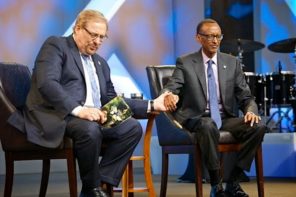A member of Uganda’s parliament has introduced legislation that would impose the death penalty on anyone convicted of “aggravated homosexuality”—an offense defined as a homosexual act involving a minor or a person with a disability, or any same-sex relations in which the accused participant is HIV-positive.
Anti-Homosexuality Bill 2009 was drafted in March, shortly after the Uganda-based Family Life Network hosted a conference that featured Holocaust revisionist and antigay activist Scott Lively, who leads an organization described as a hate-group by the Southern Poverty Law Center, and Don Schmierer, president of Exodus International.
According to Jim Burroway, a blogger who has closely followed recent events in Uganda, Lively blamed gay men for the genocide in neighboring Rwanda and suggested that homosexuals were infiltrating Uganda’s schools to “recruit” children—potent accusations in a country with its own ethnic tensions and where clashing militias have perennially sent captive child-soldiers into battle.
Uganda, described by Rick Warren as a “purpose-driven nation,” is in many ways an experiment in right-wing Christian social thought. Its endemic poverty and location at the frontier between Islam and Christianity in Africa have made Uganda—with a population of 30 million in an area about the size of Georgia and South Carolina combined—a focal point for missionary work across the denominational spectrum.
The country’s evangelical president-for-life, Yoweri Museveni, has received praise from George W. Bush, at whose encouragement Museveni narrowed the focus of Uganda’s HIV-prevention policy largely to exclude condom use in favor of abstinence, as well as Doug Coe, who described Museveni as “a good friend of the Family” in a story recounted in Jeff Sharlet’s book about Coe’s organization.
And Joseph Kony, the violently fundamentalist leader of the Lord’s Resistance Army, challenges Museveni’s control of northern Uganda with brutal raids on poorly defended villages and has thwarted U.S.-backed efforts to destroy LRA outposts in the anarchic jungle regions along Uganda’s border with Congo.
Even fine-grained aspects of daily life in Uganda reflect the fervent, hard-edged strand of Christianity that has taken root there: A nonsectarian British relief-agency worker describes the profusion of shops with names like “God Is Great Butcher” and “Jesus Loves You Hair Salon.” In a story on pastor Martin Ssempa—an agent of Rick Warren’s “purpose-driven nation” campaign who has demanded the arrest of gay activists—a Canadian journalist remarks on the number of private cars and taxis in Kampala that sport bumper stickers with the phrase “I’m covered under the blood of Jesus.”
Considering the pervasiveness of the religio-political culture that has produced Anti-Homosexuality Bill 2009—as well as the powerful American interests that support Yoweri Museveni and the strong-arm form of government he represents—it’s not surprising that the legislation seems likely to be signed into law, despite protests from an array of human rights groups.
Still, one deterrent to Museveni’s signing of the bill could be provisions to the Lord’s Resistance Army Disarmament and Recovery Act, which Sens. Russ Feingold and Sam Brownback introduced in May and which is currently under consideration by the Senate Foreign Relations Committee.
The act’s laudable goal is to help quell violence, support stabilization and build lasting peace in northern Uganda. It would not be unreasonable to ask that, in exchange for American funds to pursue those ends, Museveni and his government should foreswear violence against Uganda’s LGBT citizens in the interest of the long-term peace and stability of the entire country.




